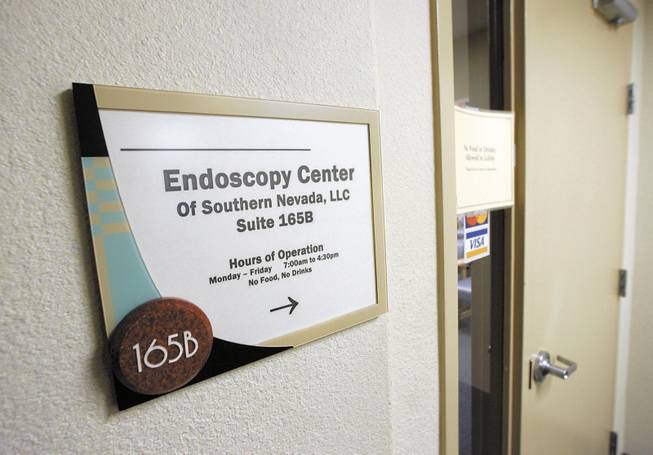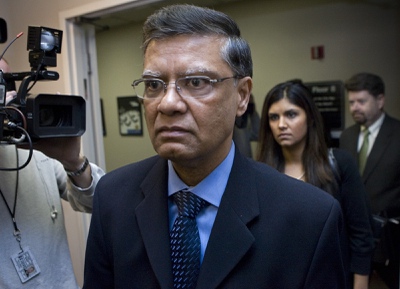
Litigation over last year’s hepatitis C outbreak continues under a confidentiality agreement. Lawyers say the seal is hindering their cases against the closed Endoscopy Center of Southern Nevada.
Wednesday, April 8, 2009 | 2 a.m.
Sun Topics
Sun Archives
- Attorneys hope to lift malpractice damages cap (3-31-2009)
- Citing dangerous care, state board mulls suspension of Vegas surgeon (3-10-2009)
- Hepatitis outbreak spurs moves to toughen regulation (3-1-2009)
- Deadline spurs endoscopy lawsuits (2-28-2009)
- For malpractice info, you'll have to phone (3-9-2008)
- Officials: Hepatitis outbreak highlighted need for changes (2-4-2009)
- Doctor faces charges in usage of drugs (12-15-2004)
- Boards' failure to discipline could cost Nevadans (10-16-2003)
Sun Coverage
Southern Nevadans and their lawmakers are eager to learn as much as possible about failing to prevent last year’s hepatitis C outbreak.
The sooner that information comes to light, the sooner those responsible can be held fully accountable and changes made to lessen the likelihood of similar medical calamities in the future.
But massive litigation over the outbreak has been mired in secrecy, keeping the public in the dark about exactly how and why thousands of patients were exposed to the potentially deadly virus.
“If ever a case cries out to be publicized and open, it’s this case,” said Ed Bernstein, an attorney for 18 infected patients who have medical malpractice trials scheduled against the Endoscopy Center of Southern Nevada. “It’s the most egregious medical conduct we’ve ever had in Southern Nevada.”
Bernstein and other plaintiffs’ attorneys want District Judge Allan Earl to lift a 10-month-old confidentiality order that has allowed the defendants and key witnesses, some of them public health officials, to keep their depositions private with little justification. The lawyers today are to discuss the matter with a court official who is assisting Earl on the case.
The lawyers have their own agendas — they say the lack of transparency is hindering their efforts to collect evidence against the shut-down clinic and its chief operator, Dr. Dipak Desai.
“We represent patients who have had to open up their entire lives in this case, list every sexual encounter they’ve had, every affair, every medical condition,” Bernstein said. “They’ve had to provide the most embarrassing information that any of us would dread giving out. And in return, the defendants are under no obligation to give us reciprocal information.
“These are the culprits who are disclosing nothing, while we, the victims, are baring our souls. There’s something wrong with how all of this is developing.”
Plaintiffs’ attorneys said they agreed to follow the confidentiality order last May, when it was sold as way to protect the privacy of the patients and any proprietary information of the defendants.
But over the past 10 months, they argue, the order has morphed into an unprecedented sealing machine the lawyers have been powerless to stop.
Depositions are being kept secret for no apparent reason, the lawyers said. Anyone who wants a deposition withheld from the public can simply give notice and have it stamped “confidential” under the terms of Earl’s six-page order.
Barry Smith, executive director of the Nevada Press Association, said he has concerns about the process.
“There certainly are valid reasons for doing this, but you have to keep in mind that the intent of the Nevada Supreme Court rules is for openness,” he said.
Judges are obligated under the rules to carefully balance privacy issues with the public’s right to know before sealing court records, he said. The Supreme Court’s rules also prohibit the sealing of records if it has “the purpose or effect of concealing a public hazard.”
But the depositions aren’t officially considered court records until they are filed with the court. Many times depositions never end up being filed.
Still, Smith said, the same desire for openness in dealing with them should be applied by the courts.
Bernstein associate Patti Wise said so much is being kept confidential in the endoscopy litigation that it is difficult to even keep track of it all. Sometimes the parties won’t say a deposition is confidential when it is taken, but they’ll send out a notice days later declaring it private, she said.
“We’re walking on eggshells every single day because we don’t know if someone is going to deem something confidential before we have a chance to give it to our experts to review,” she said.
If lawyers want to refer to a confidential deposition in a court motion, they have to file the motion under seal, which only compounds the secrecy in the case, Wise said. Sometimes, lawyers don’t even hear about motions filed under seal.
At a hearing last week before Earl, a plaintiff’s attorney had to cut short an argument when it spilled over into a subject contained in a secret deposition that could not be disclosed to third parties in the courtroom.
Even depositions of doctors and nurses who asserted their Fifth Amendment rights against self-incrimination and refused to testify have been kept confidential, plaintiffs’ attorneys said.
Last summer, after the Sun reported that an endoscopy center nurse had taken the Fifth in a deposition, Earl threatened lawyers with sanctions, including being removed from the case, if they violated the confidentiality order, transcripts of the hearing show.
Other depositions of public health officials who have offered evidence that sheds new light on the outbreak also remain secret.
Among those who have been questioned under oath behind closed doors is Brian Labus, the Clark County Health District’s chief epidemiologist who oversaw the district’s investigation into the endoscopy center. Labus, who has yet to release his final investigative report, spent four days giving his deposition this year. Attorneys representing the health district had his deposition declared confidential.
Dr. Lawrence Sands, the county’s chief health officer, was deposed over two days, and Ihsan Azzam, the state’s top epidemiologist, was also questioned at length. Sands’ deposition was classified as private, but plaintiff attorneys said they were unable to determine whether Azzam’s testimony is confidential.
The depositions of the politically connected owners of Quality Care Consultants, a defendant in the endoscopy litigation, are also being withheld from the public. Las Vegas physicians Ikramullah Khan and Javaid Anwar, who doubles as president of the Nevada Board of Medical Examiners, each spent a half-day in depositions. Their company was hired by Desai to inspect his clinics.
“People are abusing the order by blatantly saying we don’t want anything we had to say out there in the public arena,” Wise said. “We want court guidance saying that’s not acceptable.”
Gerald Gillock, another lead plaintiff attorney in the endoscopy litigation, said that in his 39 years of practicing law, he has rarely seen a deposition ordered kept under wraps.
In this case, he said, he doesn’t know of any “substantive reason” for doing it.
Veteran plaintiff lawyer Will Kemp said the defense, in his opinion, “has gone overboard” in keeping the depositions secret.
“This is just hiding embarrassing stuff from the public,” he said.
Attorney Mike Shannon, who represents the Endoscopy Center of Southern Nevada, and other defense lawyers in the litigation declined to comment.
“It’s not an appropriate thing for us to comment on because the litigation is pending,” Shannon said.
Earl was out of town and could not be reached for comment.
District Court spokesman Michael Sommermeyer said Supreme Court rules prohibit Earl from publicly discussing a pending case.
According to the confidentiality order, attorneys can challenge whether there are legitimate grounds to mark a deposition confidential after it has been so declared.
But Wise said lawyers should have an opportunity to do that before a deposition is stamped confidential.
Any defendant wishing to keep a deposition secret ought to file a motion upfront stating the reasons, she said. The other side then would have a chance to argue against it in court.
“The burden must be on them, not the plaintiffs,” Wise said. “They should have to try to sell it to the court.”


Join the Discussion:
Check this out for a full explanation of our conversion to the LiveFyre commenting system and instructions on how to sign up for an account.
Full comments policy